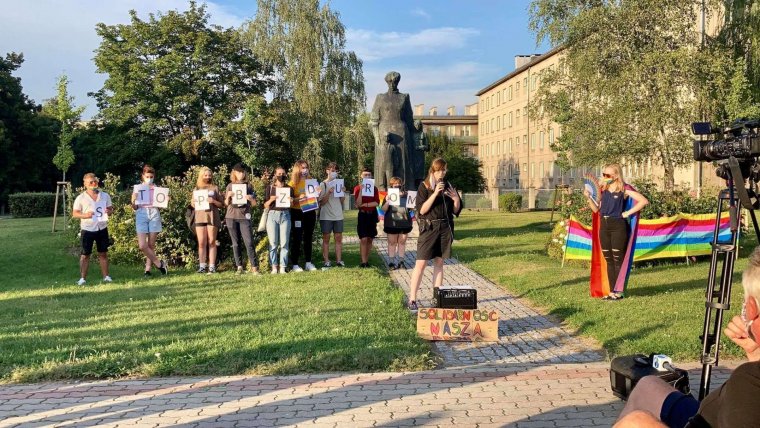Społeczne
Warsaw Uprising 2020 - sytuacja LGBT+ w Polsce oczami cudzoziemca
Poland is once again a battleground, only this time it is a war over social issues.
Tensions are running higher than ever in Poland between the nation’s LGBT+ rights advocates and the conservative government and its supporters.

Last Friday a pro-LGBT+ demonstration in Warsaw saw the arrest of prominent Polish LGBT+ activist Małgorzata Szutowicz and 48 others. Many are claiming the arrests and police response had a previously-unseen level of police aggression towards LGBT+ activists.
The following day, Saturday, thousands turned out again in Warsaw to denounce the arrests and unjust police aggression.
Those arrested in Friday's demonstration are being marked as unlawful criminals by Poland's ruling Law and Justice Party, who defended the police response, but the demonstrators were claiming that it was in fact the Polish government's intolerant behaviour toward the LGBT+ community that was extreme and unlawful.
Such behaviour that the pro-LGBT+ demonstrators were referring to is the overt anti-LGBT+ stance Poland's government is taking, with the newly re-elected President, Andrzej Duda, having campaigned very strongly in the recent election against the LGBT+ movement in Poland. The Polish government's justification for its war against the LGBT+ movement is that it is all in the protection of Polish family values. This sentiment certainly reflects some population's disdain for the LGBT community, with the south-eastern municipalities of Poland having recently declared themselves as LGBT+ ideology-free zones. In October 2019 the Polish government proposed legislation that would ban sex education in schools on the grounds that the subject is taught by LGBT+ supporters and encourages paedophilia.
Duda has been on record labelling the movement a dangerous “ideology” worse than Communism and a movement that puts Poland's identity in jeopardy.
The identity in question is Poland's overwhelming 87% population of Roman Catholics; thus, the nation's perceptions around and acceptance of LGBT+ citizens is heavily influenced by the Church. At the legislative level, same-sex activity is legal in Poland but same-sex marriages or even civil unions are not. Poland's Constitution reflects the country's Catholic view on marriage stating it is “being a union of a man and a woman”.
In July this year President Duda signed a draft amendment to the Polish Constitution which would only allow couples in marriages as recognized by the Constitution, that is between a man a woman, to adopt a child. Duda's primary election opponent, popular Warsaw Mayor Rafał Trzaskowski, who promoted LGBT rights during his campaign, also supported this draft zamendment because it reflected the views of the majority of the Polish population.
As a result, the true LGBT+ advocates in Poland say they feel not only vilified, but fear for their safety. In a small city in central Poland called Kalisz, a humble demonstration was held on Monday in response to the events in Warsaw. One of the activists, an openly gay protestor, spoke about how she felt genuinely unsafe being out alone in public because members of organizations such as the ultra-right National-Radical Camp actively identified and harassed, sometimes violently, pro-LGBT+ activists such as herself. As she spoke to the crowd, a member of the National-Radical Camp was spotted nearby taking photos of the protestors.
The extreme anti-LGBT+ stance undertaken by a portion of Poland has not gone unnoticed. In December 2019 the European Union officially condemned the adoption of LGBT-free zones in Poland, then in July 2020 the EU decided to withhold small-scale project funding for a number of the Polish towns who had declared their LGBT-free status because the discriminatory policies the towns had adopted. Poland’s Justice Minister, Zbigniew Ziobro, responded to the decision saying his government will not accept discrimination towards its citizens by the EU.
Ever since coming to power in 2015, the Law and Justice party has had a strained relationship with the EU. Naturally, its socially conservative stance is at odds with EU policies on social equality but there have been other events that have further degraded the relationship. For example, in 2017 judicial reforms in Poland lowered the retirement age of Supreme Court judges and granted the President the power to extend individual judges’ retirements at his own discretion; additionally, Poland’s National Council of the Judiciary responsible for appointing judges came under the control of parliament, which the ruling party controlled. These were significant alterations among others. The government’s reasoning for controlling Poland’s judiciary was to fight corruption and communist-era thinking. Thousands of Polish citizens protested against the changes.
All of these issues in Poland point to a tumultuous country fraught with contradiction. Poland is 87% Catholic, yet give Trzaskowki 49% of the vote; almost half the nation therefore theoretically supports LGBT+ rights but the majority are against same-sex adoption. Meanwhile, the ruling party who enjoys a majority are making legislative changes that are at odds with EU rules, yet EU membership is seen as beneficial by 86% of Poles according to a 2019 EU survey.
While Warsaw is having another uprising, Polish support and opposition is convoluted and confused. If nothing else, it is representative of other significant issues being discussed around the world such as climate change and economic reform where arguments for and against are equally contradictory.
Przypis redakcji:
Chris Williams - dziennikarz freelancer z Nowej Zelandii, obecnie przebywający w Kaliszu. Dzieli się swoimi spostrzeżeniami w kwestiach politycznych i społecznych.





![Obchodzili Powiatowo-Gminny Dzień Strażaka w Liskowie [zdjęcia]](https://calisia.pl/storage/m/077d1f6628bcedb2364/800,600,0,4375572178382418916785916614293753511184082n.jpg)




